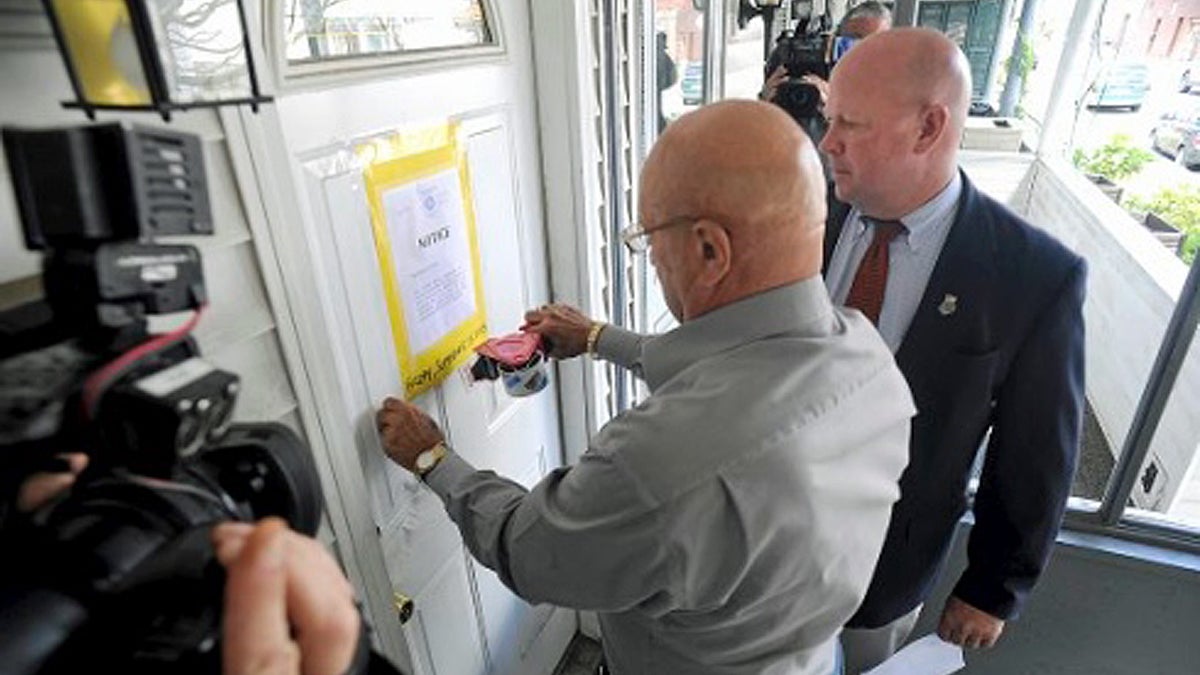Wilkes-Barre faces federal lawsuit for ‘one strike’ law

Wilkes-Barre City Code Enforcement Officer Frank Kratz, (left), and Mayor Tom Leighton post a closure notice (Mark Moran/The Citizens’ Voice)
The ACLU is challenging a 2-year-old law in Wilkes-Barre, Pennsylvania that aims to crack down on crime by evicting tenants without a court order.
In a federal lawsuit, the civil liberties group calls the city’s “one strike” law unconstitutional and asks a judge to stop the city from enforcing it.
Under the law, city officials can evict tenants from an apartment if a landlord or neighbor has “implied or actual knowledge” of illegal activity involving drugs or guns – including visitors who are not on a lease.
Wilkes-Barre Mayor Tom Leighton has said the get-tough approach has succeeded in seizing drugs and guns and removing criminals from neighborhoods. In 2013, the year the law passed, Wilkes-Barre saw 13 homicides. For a city of 41,000, that was a troubling number.
Two weeks after the law’s passage, Leighton held a news conference outside the first property to be temporarily shuttered under the legislation. Police said drugs and money believed to be part of a drug transaction were confiscated.
After helping an inspector affix an eviction notice to the door of the property, Leighton said he wanted “residents, our good residents, to know that we’re cracking down on landlords that are bringing filth and dirt and crime into our city” and that “we’re going to hit these landlords that don’t care about the city.”
The move upset the property owner, who told the Citizens’ Voice there was no way to know if his tenant was selling drugs. The law prevents landlords from renting evicted properties for six months.
ACLU attorney Scott Kelly said the law short-circuits the Constitution, violating the Fourth Amendment’s protection against unreasonable searches and the 14th Amendment’s guarantee of due process.
“One of the perverse things under this ordinance is, if you’re a landlord and you report suspected criminal activity on your property, you’re subject to punishment under this ordinance,” Kelly said. “There’s no defense that you didn’t know of illegal activity.”
Other Pennsylvania municipalities; including Scranton, Williamsport, Dunmore, and Berwick, have passed similar laws. But Kelly said enforcement in those places has been limited.
Leighton called the allegations in the suit baseless.
“My administration has a responsibility to protect residents from such activities by encouraging landlords to take pride in their tenants without turning [a] blind eye to crime for the sake of a rent check,” Leighton said in a statement. “We will continue to enforce this policy in the best interest of our residents as part of my commitment to public safety.”
The ACLU’s Kelly insists that the law is both unnecessary and illegal. The group is representing three landlords and two tenants in the case.
“You don’t need ordinances like this at all,” Kelly said. “Because there are already laws that exist that allow the city, or a landlord, to go and evict someone that they prove has been involved in drug activity before a judge.”
WHYY is your source for fact-based, in-depth journalism and information. As a nonprofit organization, we rely on financial support from readers like you. Please give today.

